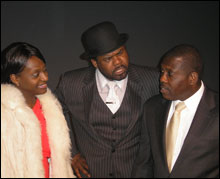 Waiting for Bessie Smith, written and directed by Ricardo Pitts-Wiley, is a generous as well as enjoyable performance. We endure a long wait, indeed, when a performer of her talent doesn’t live forever, and playing a recording just isn’t the same.
Waiting for Bessie Smith, written and directed by Ricardo Pitts-Wiley, is a generous as well as enjoyable performance. We endure a long wait, indeed, when a performer of her talent doesn’t live forever, and playing a recording just isn’t the same.
But thanks to the lively presence and first-rate voice of Lydia Angel Cooper, this Mixed Magic Theatre production (through April 15) brings the spirit of blues queen Bessie Smith to life in a way she’d very much appreciate.
The time is late 1933, with Providence still in the Depression but with Prohibition recently repealed. So the black Providence community can more easily drown any sorrows in a drink as well as through gospel music in church and jazz and blues singers in bars. Chatty’s Place is a nightclub whose namesake owner (Raidge) has booked Bessie Smith to sing, but a snowstorm threatens to stop her train in its tracks.
No problem. Bessie might not be there, but her songs can be, channeled through Miss Ella Lou Wilson (Cooper). As a preacher’s daughter, she likes to think of herself as prim and proper, but she is, after all, sneaking around with her guitar player boyfriend, Mississippi Willie Johnson (Paul Williams), who is on hand to back up Bessie.
The drummer is a no-show, but Chatty can fill in for him. With the addition of Piano Eddie (Paul Bisch), the evening is ready to go. A lot is made of Eddie being a white piano player in a black combo, and that lets us hear all about how he came to put classical music behind him and turn to blues and jazz. While on a concert tour, he met Smith on a train and spent a night club-hopping with her and her band, listening to music that made him come alive, and there was no turning back. He was no longer Edward Von Tannen but Piano Eddie. He mentions visiting Germany and playing Wagner for relatives and then blues and how they liked them both. To that, Chatty off-handedly says, “They had no choice,” and we get an essay-worth of insight into the music.
We hear a little of Bessie’s biography, but we learn more about Sissieretta Jones, who in 1876 came to Providence at age seven and began a conservatory-trained singing career, performing opera arias and popular songs all over the world. In passing, Ella Lou tells us about a husband of Sissieretta who “took advantage of her in every way he could” and of the death of a child, just enough to want to know more.
But this play is about the songs Bessie sang, and we get 16 of them. Ella Lou starts out timidly, more comfortable with gospel classics such as “The Welcome Table.” But by the end of Act One, Chatty has gotten her to “take ’em to church the blues way” with a rousing rendition of “On Revival Day” by Ella Lou and the men. Elsewhere we’re treated to familiar songs, from “ ’Tain’t Nobody’s Biziness If I Do” and “After You’re Gone,” to less-familiar blues, such as “Cake Walkin’ Babies From Home” and “Dirty No-Gooder Blues.”